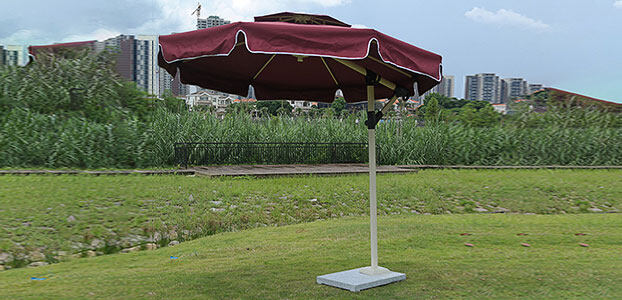Email format error
Email cannot be empty
Email already exists
6-20 characters(letters plus numbers only)
The password is inconsistent
Email format error
Email cannot be empty
Email does not exist
6-20 characters(letters plus numbers only)
The password is inconsistent


Choosing the Best UV Garden Umbrella
In an era marked by increasing environmental concerns, the prominence of UV radiation has grown substantially. This elevation underscores the significance of opting for the best UV protection garden umbrella.Such an umbrella not only elevates the aesthetic appeal of outdoor spaces but, more importantly, safeguards individuals from harmful UV rays. To gain a comprehensive understanding of this topic, it's essential to delve deeper into the intricacies of material specifications, size considerations, and the role of geographical factors.
1. Importance of UV Protection Materials
The foundational aspect of any umbrella's UV protection capability lies within its materials. Polyester and acrylic fibers emerge as stalwarts in this domain, celebrated for their innate ability to resist UV penetration effectively.
From a chemical perspective, these fibers undergo intricate treatments, often imbued with additives or coatings, enhancing their UV-blocking prowess. This scientific intervention ensures that harmful UV rays, which can penetrate deep layers of the skin and cause cellular damage, are effectively mitigated. The essence here is twofold: protection from immediate discomfort like sunburn and long-term ailments such as premature skin aging and skin cancers.
Furthermore, the realm of textile engineering has birthed specialized UV-resistant fabrics. These fabrics, often woven with precision, incorporate specific molecular structures that inherently repel UV radiation. Such advancements, backed by rigorous research in the textile sciences, have revolutionized the outdoor equipment industry, offering consumers peace of mind amidst nature's bounties.
2. Types of UV Protection Materials
Diving deeper into material specifics provides insights into their unique attributes:
Polyester Fiber: Beyond its UV protection capabilities, polyester is lauded for its durability and color retention properties. Its dense weave structure acts as a formidable barrier against UV rays. The polyester's hydrophobic nature also ensures that it dries quickly, making it ideal for regions with intermittent rain or high humidity.
Acrylic Fiber: This material is celebrated for its resilience against UV degradation. Its inherent properties resist fading, ensuring that the umbrella retains its aesthetic appeal even after prolonged exposure to sunlight. Acrylic fibers, with their soft touch and vibrant color options, offer a blend of functionality and style.
UV-Resistant Fabrics: The pinnacle of UV protection technology, UV-resistant fabrics meld cutting-edge nanotechnology with textile innovation. These fabrics, through intricate weaving patterns and specialized coatings, amplify UV protection, often surpassing conventional materials in efficacy. Moreover, their lightweight nature ensures portability without compromising protection.

3. Size, Coverage, and UV Protection
Beyond materials, the physical dimensions of a garden umbrella play a pivotal role in its UV protection efficacy. Meteorological insights suggest that an umbrella's surface area directly correlates with its shading capacity. A broader canopy translates to a larger shaded region, reducing UV exposure for individuals beneath it.
Additionally, innovative designs, such as tilting mechanisms and adjustable heights, enhance coverage versatility. Such features allow users to adapt the umbrella's orientation based on the sun's trajectory, ensuring consistent protection throughout the day.
4. Geographical Factors and UV Protection Garden Umbrella Selection
Geographical nuances significantly influence UV radiation levels. Coastal regions, for instance, often experience amplified UV intensity due to reflective surfaces like water. In contrast, high-altitude locales might present enhanced UV risks owing to reduced atmospheric filtration.
Climatological studies underscore the variability of UV exposure based on latitude, altitude, and proximity to water bodies. For instance, equatorial regions, with their direct sun overhead, necessitate heightened UV protection measures. Conversely, temperate zones, although milder, still warrant vigilant UV protection, especially during peak sun hours.
Conclusion
In navigating the multifaceted realm of UV protection in garden umbrellas, a holistic approach is paramount. Prioritizing material quality, understanding size implications, and acknowledging geographical influences ensure informed decision-making. The quest for the best UV protection garden umbrella transcends mere functionality; it embodies a commitment to health, well-being, and harmonious outdoor living. As technological advancements persist and scientific insights deepen, consumers are poised to benefit from increasingly sophisticated solutions, fortifying their outdoor experiences against the omnipresent UV challenge.
